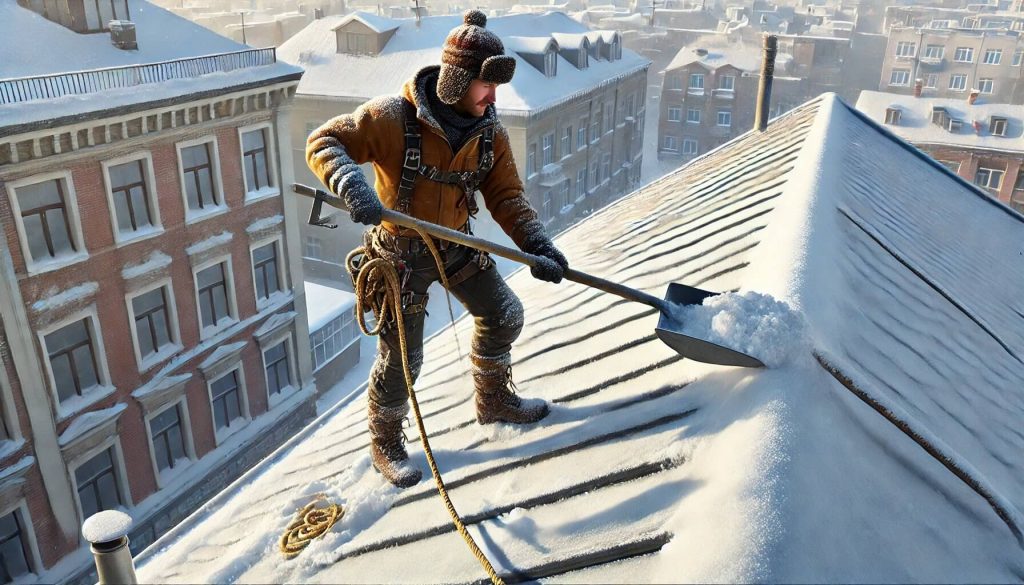Features of High-Altitude Work in the Winter Period: What to Consider?

Winter is the time of year when weather conditions can make high-rise work much more difficult. Snow, ice and low temperatures create additional risks for workers and equipment. For example, icy surfaces can make building facades and work areas slippery, increasing the likelihood of accidents. In addition, high winds and precipitation can make it difficult to use lifting equipment, and low temperatures adversely affect machinery and materials such as paints and construction mixtures. This requires special care and training on the part of professionals to ensure the safety and quality of the work.
How to Minimize Risks During High-Altitude Work in Winter?
Winter requires special attention to safety when performing high-altitude work. Severe frosts, ice, and gusty winds create additional threats for both workers and equipment. First of all, industrial climbers must be equipped with special winter gear. This includes thermal protective clothing that retains warmth and doesn’t restrict movement, as well as anti-slip boots. Safety systems and ropes should be regularly inspected for strength, as materials can lose elasticity in low temperatures, increasing the risk of breakage.
It’s important to monitor the physical condition of workers. In extreme cold, a person can fatigue faster and lose concentration. That’s why work shifts in winter are usually shorter, and rest periods between shifts are longer, to minimize the impact of fatigue and hypothermia on safety and efficiency.
Additional safety measures include regular checks and maintenance of climbing equipment: carabiners, ropes, and lifting systems can freeze or ice over, reducing their functionality and increasing the risk of accidents. All tools and devices must be protected from low temperatures to ensure reliable operation in winter conditions.
Preparing Buildings and Equipment
Proper preparation is key to successfully performing high-altitude work in winter. First, it is necessary to clear the working area on the facade or roof of the building from snow and ice. These surfaces can become slippery and dangerous for both people and equipment. This may require the use of de-icing agents or manual cleaning of facades and roofs.
The condition of the building where the work will take place should be thoroughly inspected. During winter, surfaces, especially old or damaged ones, may be subjected to additional stress. Repair work on such structures should consider these factors to avoid damaging the construction.
As for equipment, it is important to ensure that all mechanisms and lifting devices are prepared for low-temperature operation. For example, cranes and lifts should be tested for resistance to freezing. It’s also crucial to consider that construction materials such as paints, sealants, and mortars may lose their properties in cold temperatures. This requires either the use of special winter compounds or careful planning to avoid performing critical stages during extremely cold days.
Planning and Scheduling High-Altitude Work in Winter
Planning high-altitude work in winter requires a flexible approach and detailed consideration of weather conditions. Winter is characterized by variable weather, especially in regions like Kyiv, where frosts can alternate with thaws, and snowfalls with freezing rain. This makes weather forecasting a critical element in planning high-altitude work. A competent company anticipates potential “windows” of suitable conditions and allows extra days in the schedule for possible delays.
Experienced specialists always prepare a contingency plan for unforeseen weather conditions. For example, on days of heavy snowfall or wind, when outdoor work is impossible, preparatory or indoor stages that do not depend on the weather can be carried out. Thus, even if the main tasks are temporarily halted, the process continues.
Logistics and materials need to be carefully considered. In winter, the delivery of equipment and construction materials may be hampered by snowfalls or icy roads. This requires additional planning and coordination with suppliers to ensure uninterrupted work on the site.
Our company AlpStar specializes in performing high-altitude work, including facade maintenance, window cleaning, and construction installations during the winter period. We have extensive experience and the necessary equipment to operate in any weather conditions, ensuring safety and quality at every stage.
